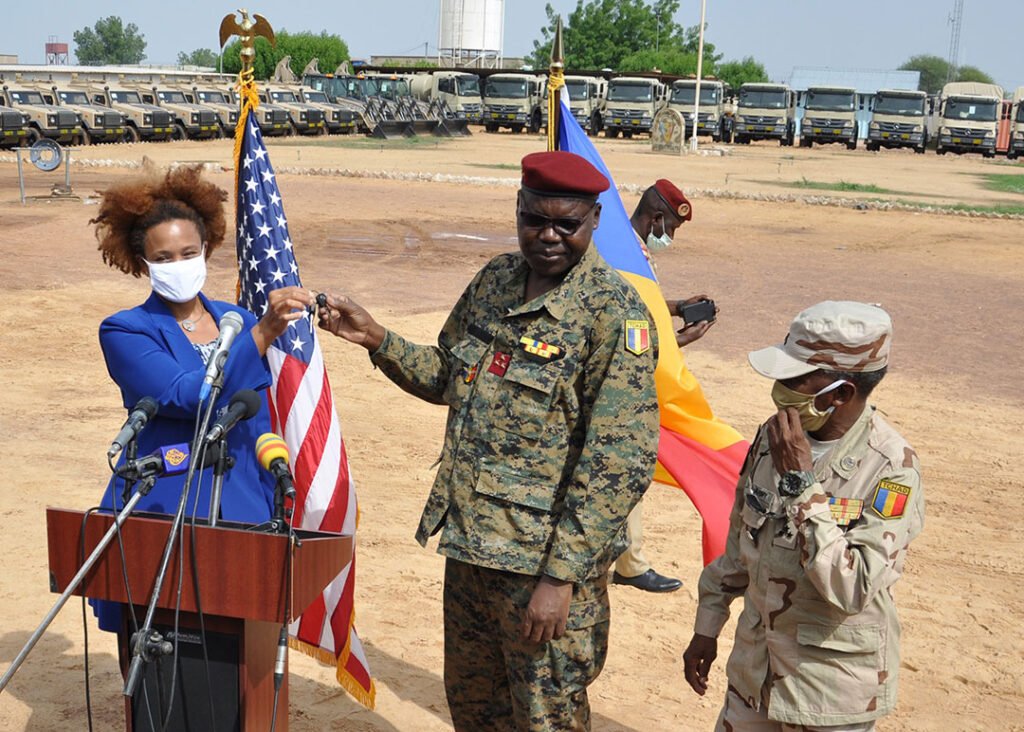ADF STAFF
The U.S. helped Chad’s fight against extremists in the Lake Chad region by donating $8.5 million in materiel to the country’s Special Anti-Terrorism Group (SATG), which is fighting alongside troops from neighboring countries as part of the G5 Sahel Joint Force.
Along with Chad, the 5,000-person G5 Sahel Joint Force is made up of troops from Burkina Faso, Mali, Mauritania and Niger. The force was created in 2017 as a unified response to extremist factions such as Boko Haram, al-Qaida in the Islamic Maghreb and other insurgent groups that operate across national borders in the thinly populated belt south of the Sahara.
The U.S. has supported the SATG, Chad’s premier fighting force, through a variety of security assistance programs since its inception in 2005. In recent years, the U.S. has donated dozens of vehicles and other equipment and provided extensive medical training to support the group’s mission.
Chad is an essential pillar in the fight against terrorism in the Sahel, said Dr. Bakary Sambe, director of the Timbuktu Institute-African Center for Peace Studies. Along with the G5 Sahel Joint Force mission, Chad participates in two other anti-terrorist forces: the Multinational Joint Task Force and the United Nations Multidimensional Integrated Stabilization Mission in Mali.
The new donation includes vehicles and equipment consisting of 28 armored vehicles, 10 trucks, eight water tankers, two maintenance vehicles, tools, communications equipment and vehicle spare parts. They are in addition to the 99 vehicles provided under a $28 million U.S. initiative.
U.S. Embassy Chargé d’Affaires Jessica Davis Ba presented the latest round of materiel to Gen. Abdramane Youssouf Mery, commander of the SATG. She thanked Chad for its anti-terrorism efforts in the Lake Chad region and the Sahel and said the U.S. will continue to support Chad’s work on that front.
Mery said the U.S. equipment was critical to April’s successful Wrath of Boma military operation against Boko Haram in the Lake Chad region.
The U.S. support comes at a time when Chadian forces are being called upon by their G5 partners to provide more aid to the project’s efforts. So far, Chad’s forces have been instrumental in the G5 efforts across the region, said Daniel Eizenga, a research fellow at the Africa Center for Strategic Studies.
Chadian forces have played key roles in fighting Boko Haram and the Islamic State West Africa in the multicountry region around Lake Chad. They’re also the second-largest contingent in the U.N. peacekeeping mission in Mali.
“Their forces have proven to be some of the most effective at pressuring insurgent forces and retaking territory that had been previously occupied by militant Islamist groups,” Eizenga told ADF. “Chadian forces face numerous serious security threats in multiple theaters. Consequently, their security needs are significant and dynamic.”
Chad’s involvement in multinational efforts such at the G5 Sahel force remains an important part of corralling extremist groups, limiting their influence and restricting their support, he said.
“Sustaining a regional security presence across these border areas would help to wear down militant Islamist groups by stressing their supply lines and cutting off their revenues.” Eizenga said. “It would also help to improve community engagement, potentially improving overall intelligence and counterintelligence for regional forces.”
With that in mind, Sambe said, Chad’s dedication to the G5 Sahel and other multinational forces still must produce results for the country itself.
“The Chadian people needed to see a return on investment from their Army’s commitment,” Sambe said.

